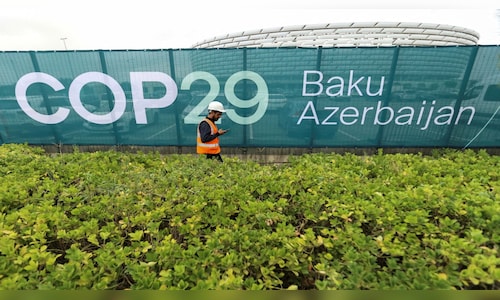
India, one of the world’s fastest-growing economies, requires significant resources to transition towards a low-carbon future. According to Vaibhav Chaturvedi, Senior Fellow at the Council on Energy, Environment, and Water (CEEW), the country will need around $10 trillion by 2070 to meet its decarbonisation goals. This estimate underscores the glaring inadequacy of the COP29 decision, which not only ignores the vast financing needs of developing nations but also signals a lack of ambition from the developed world.
India’s stance at COP29 was clear: meaningful climate action requires meaningful finance. The $300 billion annual commitment pales in comparison to the $1 trillion annually that developing nations collectively demanded. These demands were not arbitrary but based on thorough assessments of the financial requirements to accelerate progress towards the global net-zero target. However, the developed nations, led by Europe, remained steadfast in their refusal to meet these demands, with Chaturvedi labelling their position as a “final nail in the coffin” for the 1.5-degree Celsius target.
The developed world’s unwillingness to budge not only undermines global climate ambition but also creates a significant obstacle for nations like India. Without access to adequate and affordable financing, India’s efforts to transition from coal to renewable energy and electrify its transport sector are likely to slow down, Chaturvedi said.
India’s frustration with the COP29 process was evident in its scathing statement at the summit’s conclusion. Accusing the presidency of stage-managing the proceedings, the Indian delegation criticised the lack of inclusivity and transparency in finalizing the finance text. “We had informed the presidency… that we wanted to make a statement prior to any decision on the adoption. However, this has been stage-managed, and we are extremely disappointed with the outcome,” India asserted. The allegation stemmed from procedural lapses during the closing plenary, where countries were not given a fair opportunity to voice their concerns.
Below are the excerpts from the interview.
Q: As far as this COP is concerned, where does this leave India with its climate financing needs per year? What are our needs? What is the shortfall? And if there is a shortfall, how are we going to possibly fund that?
Chaturvedi: There are various estimations for India. CEEW’s estimate is by 2070, collectively we need around $10 trillion between let’s say 2020 and 2070. The global number was till 2035, we need like $1 trillion for all the developing economies collectively. And the number on financing has to be looked given how ambitious you want to get in terms of decarbonisation. So, if you don’t give us finance, forget that we’re going to be ambitious. It is that kind of thing. So, if the developed world has now not given any meaningful finance, all the talks of ambition, like you have to do more on let’s say, moving away from coal towards solar or move towards electrification in the transport sector, all those accelerated actions, they very clearly take a hit. And all the money that is also coming is also not in terms of grants or low-cost finance. It is coming on high-cost loans.
African economies very clearly said that it is leading to high indebtedness in many of these economies because historically, they’re not responsible, but they’re now forced for these interventions through high-cost loans which is very bad for their economies. So, nobody’s happy about not just the money, but also the form in which money will come, which is mostly not grants. So, it doesn’t leave India in a very good situation. Ultimately, that means whatever targets we take, it is going to be financed by domestic money. So not a very happy situation as far as pushing ambition is concerned.
Q: The primary reason why this COP was happening was to increase the ambition on climate finance and hopefully achieve the financing of $1.3 trillion a year. That has clearly not happened. Which are the nations you think were instrumental in making sure that the financing goal is only increased from $100 billion a year, which was agreed upon in 2019, to $300 billion a year?
Chaturvedi: I think it is very clear it was a developed world, especially Europe, that was kind of hell-bent on not increasing the amount. The developing world was very clear in terms of its ask. It asked for over $1 trillion annually by 2035, because that is what the needs assessment shows. So the demand from developing countries was not baseless. It is based on certain analysis, based on the needs, that is the requirements of finance for pushing towards or accelerating ambition towards the net zero goal. The developed world kind of simply didn’t budge beyond $300 billion, which is a paltry amount compared to what is the requirement. So it’s a huge let-down essentially.
The fight towards the 1.5-degree goal, I think is the final nail in the coffin. Europe has especially kind of delivered this blow.
Q: India came out with an extremely strong statement stating, “We had informed the presidency, we had informed the secretary that we wanted to make a statement prior to any decision on the adoption, however, this is for everyone to see that this has been stage-managed and we are extremely disappointed with the outcome.” Why do you think India called this stage-managed? Was India somehow not kept privy to what happened in the end, what was happening with the climate finance end?
Chaturvedi: I think the way the process happens in the closing plenary, the more inclusive and equitable process is that the presidency kind of says that this is the text, this is the final text or rather the draft text, and are there any comments by any countries? And that’s the time when many countries kind of intervene and say that we don’t agree. So this shouldn’t be the deal. However, the presidency simply kind of announced that this is the text and then didn’t even allow any comments to come and just the hammer was kind of placed on the table, which means that the deal is done. And after everybody started congratulating each other. And then after that, India very clearly entered and said that you didn’t even look at our raised flag that we had an intervention, and you clearly ignored it. And this does appear to be stage-managed. So this is the process. The way the process should have been followed was not followed. And that is where the strong words that you saw coming from India were in response to this kind of very unfortunate process, the way it kind of panned out.
Q: China was silent through the adoption process, showing its tacit approval. Why was China quiet? What role did China play in these negotiations on the climate finance ambition?
Chaturvedi: China has a very peculiar role because one of the big demands of the developed world was that the donor base should be increased. Essentially, China is a big economy, but also it is investing around the world, especially through BRI investments. So the developed world wanted the donor base to grow for climate finance. China very smartly was sitting within the G77+ China group, which is essentially a developing country bloc. So China was involved in the process, but China was very smartly not making any noise because it was the target of the developed world, China plus Saudi Arabia because both of these are very rich economies, but they were very comfortably sitting under the developing economies categorisation. So it kind of very smartly just kept mum throughout the process. Also, China does not need money. Why was India so much vehement and kind of disappointed is because India does need money. We don’t want to move our fiscal money to the climate kind of low-carbon interventions as compared to the education, health and infrastructure-related demands, which are also huge for a fast-growing economy.



